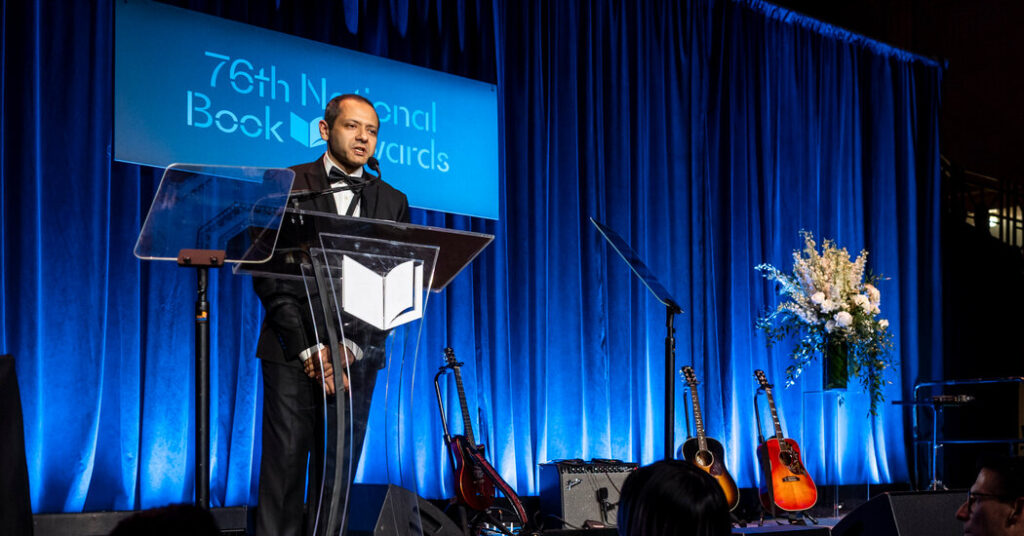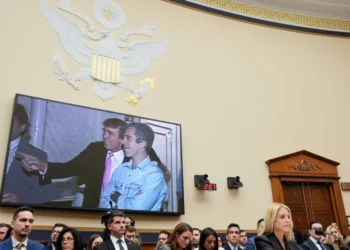Omar El Akkad’s “One Day, Everyone Will Have Always Been Against This,” a brief, searing indictment of American and European responses to the devastation in Gaza, took home the National Book Award in nonfiction Wednesday night, one of three prizes awarded to writers of Middle Eastern origin who addressed the traumatic past and present of the region in their books and in their remarks.
El Akkad, an author and journalist, was born in Egypt, grew up in Qatar and Canada and now lives in the United States. He wrote two novels previously.
“It’s very difficult to think in celebratory terms about a book that was written in response to a genocide,” El Akkad said in accepting the prize. “It’s difficult to think in celebratory terms when I spent two years seeing what shrapnel does to a child’s body. It is difficult to think in celebratory terms when I know that my tax money is doing this, and that many of my elected representatives happily support it.”
Rabih Alameddine won the fiction prize for “The True True Story of Raja the Gullible (and His Mother),” a comic novel about a 63-year-old Beirut high school teacher and “neighborhood homosexual” who lives with (and spars with) his mother. In the young people’s literature category, Daniel Nayeri, who as a child emigrated from Iran with his parents, won for “The Teacher of Nomad Land: A World War II Story,” a novel about two siblings in Iran during the war.
The National Book Award, which honors literature published in the United States, was established in 1950 and is among the most prestigious literary prizes in the country. Past recipients include William Faulkner, W.H. Auden, Ralph Ellison, Jesmyn Ward and, in 2024, Percival Everett.
The awards ceremony, a black tie event at Cipriani Wall Street in Manhattan, began with a musical performance by Corinne Bailey Rae, resplendent in a green velvet dress covered in golden stars, followed by a monologue by the evening’s host, the actor Jeff Hiller, who told a room of publishing professionals that he initially found a typo on the spine of his memoir “Actress of a Certain Age.” (It said “Actress of a Cetain Age.”)
Though the evening had other moments of levity — Alameddine gave thanks to his gastroenterologist, and sported the comic strip characters Nancy and Sluggo on his tie — many of the speeches soberly addressed ICE raids, the plight of refugees and attacks on free speech.
Accepting the award for translated literature, the Argentine writer Gabriela Cabezón Cámara spoke in Spanish; her translator, Robin Myers, said the novelist did so because it would anger “fascists.”
Their winning novel, “We Are Green and Trembling,” is based in part on the life of a 17th-century Spanish explorer, a woman who lived as a man.
The poetry winner was “The Intentions of Thunder: New and Selected Poems,” by Patricia Smith. She used her time onstage to summon images of her mother — extraordinarily harsh with her as a child, then seeming “emptied” during her years in a nursing home. Smith also remembered, as a young girl, how she tried to lighten her skin.
“There I was, looking for the top of the place I was, looking for the next place, looking for another home and another skin,” Smith said. “But what the poets say to me: Child, look at where you are. Look at the blessings you’re trying so hard to be beyond.”
The National Book Foundation also awarded two lifetime achievement awards on Wednesday.
George Saunders, an author and creative writing professor, was presented with the Medal for Distinguished Contribution to American Letters. Saunders is the author of 13 books, including “Tenth of December,” a story collection that was a fiction finalist for the 2013 National Book Award. His next novel, “Vigil,” comes out in January.
“I want to thank those of you who have read my work over the years, and because I’m so happy, I also want to thank those of you who had planned to read it, but never quite got around to it,” he said. “And even those of you who never had any real intention of reading it but sometimes claim that you already have.”
Roxane Gay received the Literarian Award for Outstanding Service to the American Literary Community. Gay is an editor, publisher and cultural critic whose books include “Bad Feminist,” an essay collection, and “Hunger,” a memoir.
She has worked to elevate underrepresented voices in the world of publishing, including at the eponymous imprint she founded at Grove Atlantic.
“I refuse to work from a scarcity mind-set,” Gay said in her acceptance speech. “There is room for all of our voices, and the people in this room have the power to do better.”
Elizabeth A. Harris covers books and the publishing industry, reporting on industry news and examining the broader cultural impact of books. She is also an author.
The post Books That Examine the Past and Present of the Middle East Take National Book Awards appeared first on New York Times.




